牛津深圳版初一英语上Unit2 reading词汇语言点world
牛津深圳版七年级上册英语U2 Reading-最新

c senior high
2 Sam's favourite subject is _____.
a Maths
b Geography
c English
3 Sam often _____ during the morning break. a plays with his best friends b takes part in the school band practice c reads books
Comprehension exercise Unit 2 Reading
D1 Read the article on page 17 and circle the correct
answers.
1 Sam is a _____ school student.
a primary
b junior high
1 Classes start at 8 a.m., and I am seldom late.
a often
b not often
2 We have our morning break at 9:50 a.m. a a short time between lessons b a short holiday
_in__th_e__w_o_r_ld_._______________________ Morning: Morning break starts at _9_:5_0__a_.m__. and ends
at 1_0_:_1_0_a_._m_.. Sam and his friends usually p_l_a_y_g_a_m__e_s. Lunch time: from _1_1_:5_0__a_.m__. to _1_2_:3_0__p_.m__._. Afternoon: Classes end at __3_:_3_0_p_._m_._
牛津深圳版(广州沈阳通用)七年级英语上册 Unit 1-4 重难点词汇和句型

牛津深圳版(广州沈阳通用)七年级英语上册Unit 1-4 重难点词汇和句型7年级英语广场朗读资料-U1重点短语1. close to 接近2. go to school 去上学3. be good at doing 擅长做4. make friends with和…交朋友5. all over 遍及6. all over the world 全世界7. ‘d like to do = would like to do愿意(想)做…8. welcome to…欢迎来到9. be from / come from 来自10. live with 和…生活在一起11. in my free time 在我的空闲时间12. by school bus (介词短语,乘坐校车)13. take the school bus (动词短语,乘坐校车)14. far(away) from 远离15. listen to music 听音乐16. read books 读书17. look like 看起来像18. lots of= a lot of 许多19. on the internet 在网上20. hear from sb. 收到某人来信21. best wishes 最好的祝愿22. hope to do… 希望做…翻译句子23. 欢迎来到我的博客。
Welcome to my blog.24. 我来自德国I am from Germany. I come from Germany.25. 我和我的家人住在一个靠近山的房子里。
I live with my family in a house close to some mountains.26. 我有一个哥哥和一个姐姐I have an elder brother and an elder sister.27. 我每天坐公交车上学。
Every day, I go to school by school bus.28. 我最喜欢的科目是数学,艺术和科学。
深圳牛津版初中英语七年级英语上册Unit2词汇与语法
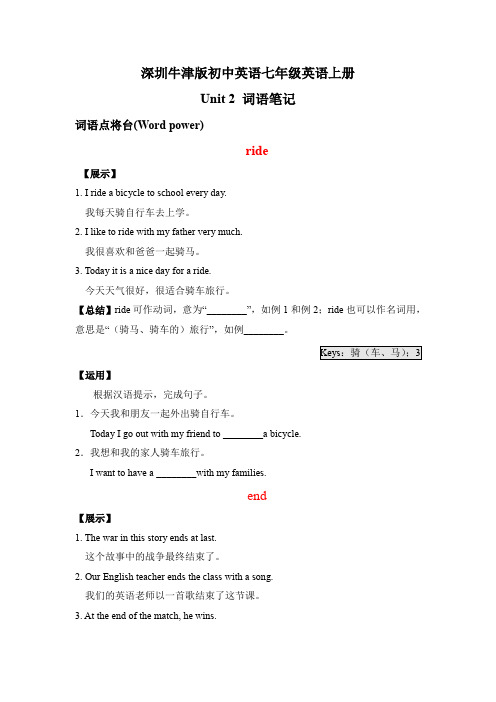
深圳牛津版初中英语七年级英语上册Unit 2 词语笔记词语点将台(Word power)ride【展示】1. I ride a bicycle to school every day.我每天骑自行车去上学。
2. I like to ride with my father very much.我很喜欢和爸爸一起骑马。
3. Today it is a nice day for a ride.今天天气很好,很适合骑车旅行。
【总结】ride可作动词,意为“________”,如例1和例2;ride也可以作名词用,意思是“(骑马、骑车的)旅行”,如例________。
Keys:骑(车、马);3 【运用】根据汉语提示,完成句子。
1.今天我和朋友一起外出骑自行车。
Today I go out with my friend to ________a bicycle.2.我想和我的家人骑车旅行。
I want to have a ________with my families.end【展示】1. The war in this story ends at last.这个故事中的战争最终结束了。
2. Our English teacher ends the class with a song.我们的英语老师以一首歌结束了这节课。
3. At the end of the match, he wins.比赛的最后,他赢了。
【总结】end作动词,意为“________”,如例1; end…with…意为“以………结束……”,如例2;end也可以作为名词用,意为“结束”,构成短语________ “在……的结尾”,如例3。
Keys:结束;at the end of 【运用】根据汉语提示,完成句子。
3.他的故事结束了。
His story ________.4.童话爱情故事的最后,王子和公主在一起了。
________the fairy-tale love story, the prince and the princess get together.practice【展示】1. We need more practice in playing the piano.我们需要多练习一下弹钢琴。
Unit2Vocabulary词汇课件牛津深圳版英语七年级上册

just
恰好
Thank you !
6、go to bed 去睡觉(fall asleep 睡着) 7、get up 起床(wake up 叫醒) 8、on foot 步行 9、be full of energy充满活力(=be filled with ….) 10、get... ready for 准备好 11、put on 举办,上演,穿上 12、clean up 打扫干净(tidy up整理) 13、pick up 取,摘,接sb.
4、develop v. 发展
developed adj. 发达的 developing adj. 发展中的 development n. 发展 developed country 发达国家 developing country发展中国家
5、skill n. 技能
skilled/ skillful adj. 熟练的
6、teen adj. 青少年的
数字+teen:fifteen, sixteen teenager n. 青少年(13-19)
7、greeting n. 问候
greet v. 问候
8、energy n. 精力
energetic adj. 精力充沛的 powerful adj.
9、luckily adj. 幸运地
新G7U2 School Life
Words and phrases
1、activity n. 活动
active adj. 积极的
2、practise v. 练习
practice n. 练习 practise doing sth.练习做某事
3、solve v. 解决
solution n. 解决办法
mood 情绪,心情
新版深圳牛津版英语七年级上chapter2_Daily_Life
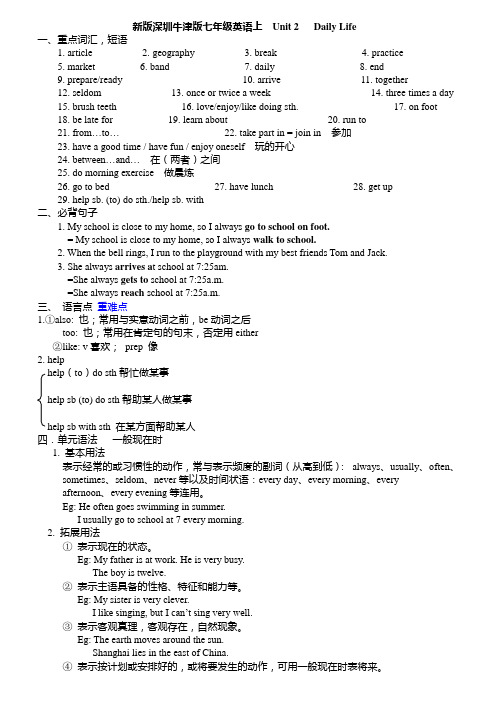
新版深圳牛津版七年级英语上Unit 2 Daily Life一、重点词汇,短语1. article2. geography3. break4. practice5. market6. band7. daily8. end9. prepare/ready 10. arrive 11. together12. seldom 13. once or twice a week 14. three times a day15. brush teeth 16. love/enjoy/like doing sth. 17. on foot18. be late for 19. learn about 20. run to21. from…to…22. take part in = join in 参加23. have a good time / have fun / enjoy oneself 玩的开心24. between…and…在(两者)之间25. do morning exercise 做晨炼26. go to bed 27. have lunch 28. get up29. help sb. (to) do sth./help sb. with二、必背句子1. My school is close to my home, so I always go to school on foot.= My school is close to my home, so I always walk to school.2. When the bell rings, I run to the playground with my best friends Tom and Jack.3. She always arrives a t school at 7:25am.=She always gets to school at 7:25a.m.=She always reach school at 7:25a.m.三、语言点重难点1.①also: 也;常用与实意动词之前,be动词之后too: 也;常用在肯定句的句末,否定用either②like: v喜欢;prep 像2. helphelp(to)do sth帮忙做某事help sb (to) do sth帮助某人做某事help sb with sth 在某方面帮助某人四.单元语法一般现在时1. 基本用法表示经常的或习惯性的动作,常与表示频度的副词(从高到低):always、usually、often、sometimes、seldom、never等以及时间状语:every day、every morning、everyafternoon、every evening等连用。
深圳牛津七年级第一、二单元课文及语法知识归纳

深圳牛津七年级第一、二单元课文及语法知识归纳牛津英语七年级上期各单元知识点归纳Chapter One Making friends Reading1. What do you know about……关于……,你知道多少?2. Friends often write to each other about their hobbies. Can you match the hobbies in the box with the picture below?write to sb. about sth. 就某事写信给某人in the box 在方框里match……with 把……和……匹配each other= one another彼此,互相3. Write down your hobbies. 写下你的爱好。
write down写下write to sb. 写信给某人4. Anna’s blog. sb?s 某人的Her parents’ na mes. 以s结尾时,只加’即可。
5. tell sb sth. 告诉某人某事tell a lie/ story 说谎/ 讲故事speak to sb. 对某人说话speak English 说英语talk to/ with sb 与某人交谈(to :单向;with:双向)listening to music reading books playing basketball(playing the piano)6. Welcome to my blog. welcome to sp. 欢迎来到某地7. I’m from Germany. 我来自德国。
be from= come from 来自Germany 德国German adj. 德国的n.德语;德国人(two Germans)German cars are very good. She was born in Germany.The Germans speak English very well.8. I?m 11 years old. 我十一岁。
牛津深圳版七年级上册unit2语法知识复习

一般现在时 1.基本用法
3.按时间表(timetable)将要发生的动作 (课表、航班表、车程表等)
3.The train starts at 2 o’clock.(火车两点开) go, come, leave, start, move 表将来
— Mom, I want to go camping with my classmates.
— Ok, sweet, havห้องสมุดไป่ตู้ a good time.
Production
根据汉语提示完成句子。
1. 这是一篇关于我们学校生活的文章。
This is _a_n_a_r_ti_c_le_ _ab_o_u_t_ our school life.
2. 数学老师很和蔼,他很少生气。
The Maths teacher is very kind and he _se_l_d_o_m_ gets angry.
3. 约翰喜欢参加学校组织的活动。
John enjoys t_a_k_in_g_ __p_a_rt_ ___in_ the school activities.
4. He_w__a_s_h_e_s(wash) clothes with his hands. 5. Simon _p_a_s_s_e_s(pass) the ball to Daniel.
6. Miss Li_t_e_a_c_h_e_s(teach) Chinese. 7. Look at the animal, it _h_a_s_ four legs.
sports meeting and won prizes.
Unit2重点词汇和课文讲义牛津深圳版英语七年级上册(1)

U2重点词汇和课文【知识要点】【知识点一】单词一、重Array点词汇梳理1.daily 日常的【考点】同义词=everyday2.never 从不3.ride 骑;驾驶【考点】过去式:rode4.seldom 不常;很少【考点】同义词= not often5.break 休息;打破【考点】1. V 表示打破,过去式broke2. n 表示休息,have a break = have a rest6. ring 发出声音【考点】1. 同义词= make a sound2. 过去式rang7. end 结束【考点】同义词= stop8. practice 练习【考点】1. practice 后接动词,需用doing形式9. together 在一起【考点】同义词= with each other10. walk to sw 步行去某地= go to sw on foot.11. take part in 参加【考点】同义短语= join in12. have a good time 玩得开心【考点】同义词组= enjoy oneself / have fun13. enjoy 享受【考点】1. enjoy后接动词,需用doing 形式2. enjoy后接代词,需用反身代词enjoy oneself = have a good time 练习:单词填空1)My elder sister is in Class Two,G________Six2)It is very important in our d________life.3)I have a nice bike and I often r________it to school.4)Beyond is a famous b________.It has made great music.5)I think I need a lot of p__________to win the game.6)The film starts at eight thirty and e______at ten thirty.7)Li Ming is writing an a____________about daily life.8)Tom is a member in the school b___________.He plays the guitar very well.9)There is a big m_________near here. People can buy many things there.10)Before I finally learnt to r_______ a bike, I first fell down many time.◆◆ 词组1. junior high school 初级中学2. on foot 步行3. take part in=join in 参加4. have a good time=enjoy oneself 过得愉快5. go to bed/sleep 睡觉6. talk about 谈论7.brush teeth 刷牙8.watch TV 看电视9. ride a bicycle/bike 骑单车10. play the piano 弹钢琴11. wash clothes 洗衣服12. in the morning 在早上13.have break 休息14. from...to...从…到…15. at night=in the evening 在晚上16. at school 在学校17. get up 起床18. senior high school 高级中学19. have breakfast/lunch/supper/dinner 吃早/午/晚/正餐20. keep a dairy 写日记21. think of 考虑22. do morning exercises 做早操23. a piece of bread 一片面包24. a glass of... 一杯...... 25. at the end of... 在......末26. how long 多久,多长时间27. between...and... 在......和,,,,,,之间28. afterschool activities 课外活动29. how often 多久一次经典句型:1.H ow do /does... go to school?2.How long is...3.I alway have a good time...4.Is...close to...?5.Once a month ,I...6.How often do you...?7.They t hink ...as...详细讲解1.Listen to a boy talking about his weekend.【考点聚焦】Talk about意为“ ”,后面既可以接人,也可以接物。
牛津深圳版七年级英语上册课本学习知识
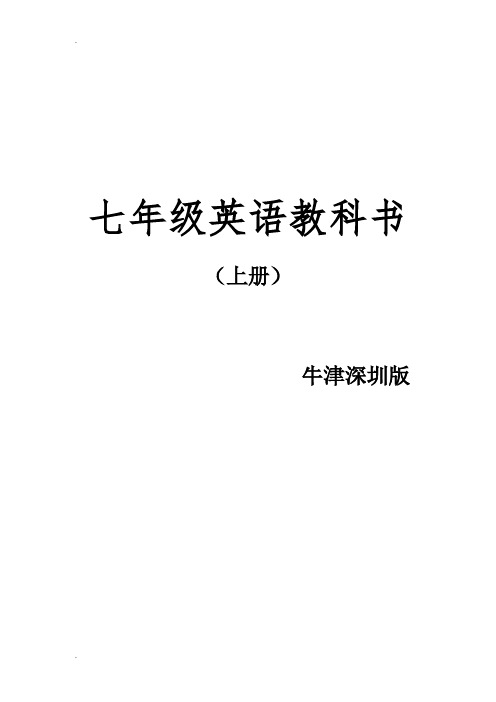
.. 七年级英语教科书(上册)牛津深圳版Unit 1 Making friendsGrammar : learn how to ask and answer wh- questions.Learn when to use a or an before nouns.Writing : complete an email to a new friendAnna’s blogHello everyone. Welcome to my blog.About meMy name is Anna. I’m from Germany. I’m 11 years old. I’m tall and thin. I have long hair. I live with my family in a house close to some mountains. My mum is an Art teacher. My dad is a doctor. I have an elder sister and an elder brother.About my school and my hobbiesEvery day, I go to school by school bus. My favourite subjects are Maths, Art and Science. I like my school because the teachers are all very friendly. My dream is to be an engineer.I like many sports. I’m good at swimming and playing basketball. These are my favourite hobbies.I want to make friends with young people from all over the world! Email me,please!V ocabulary1.Hello everyone.a all peopleb some people2.I live with my family in a house close to some mountains.a nearb far away from3.I like my school because the teachers are all very friendly.a happyb nice and kind4.These are my favourite hobbies.a things I must dob things I like doing in my free time5.I want to make friends with young people from all over the world.a some countries inb every country inUnit 2 Daily lifeGrammar : learn how to use the simple present tense.Learn how to use adverbs and adverbial phrases of frequency.Writing : complete an article about a girl’s daily life.A day at schoolI am a junior high school student. I love going to school.My school is close to my home, so I always go to school on foot. Classes start at 8 a.m., and I am seldom late. My favourite subject is Geography. I enjoy learning about different places in the world.In the morning, we usually study Chinese, Maths and English. We have our morning break at 9:50 a.m. When the bell rings, I run to the playground with my best friends Tom and Jack. We often play games. Break ends at 10:10 a.m. How short it is! Lunch is from 11:50 a.m. to 12:30 p.m. Afternoon classes end at 3:30 p.m. Then Tom, Jack and I take part in the school band practice. We make great music together.I always have a good time at school.V ocabulary1.Classes start at 8 a.m., and I am seldom late.a oftenb not often2.We have our morning break at 9:50 a.m.a a short time between lessonsb a short holiday3.When the bell rings, I run to the playground with my best friends Tom and Jack.a make a soundb is quiet4.Afternoon classes end at 3:30 p.m.a stopb begin5.We make great music together.a with each otherb every dayUnit 3 The EarthGrammar : learn how to use countable and uncountable nouns.Learn how to use the pattern there is / are......Writing : complete a report on protecting the Earth.Protect The EarthThe Earth is a beautiful place. There are forests and rivers, mountains and fields. Some places are very hot, and some are very cold.There are many different plants. Some are large. Some are small. All plants need light and water. There are different animals on Earth too. Some live on the land. Some fly in the sky. Some live under the water.There are also many people like you and me on Earth. The Earth provides us with air, water and food. It is our home.Today, there is a lot of pollution. We burn things to make energy. This pollutes the air. We put our rubbish into the sea and under the ground. This pollutes the Earth and kills animals and plants.We must stop doing these things. It is important for us to protect the Earth for our future.V ocabulary1.The Earth provides us with air, water and food.a givesb shows2.We burn things to make energy.a set.... on fireb make ... very strong3.This pollutes the air.a make ... cleanb makes ... dirty4.This pollutes the Earth and kills animals and plants.a cleans b makes (i)5.It is important for us to protect the Earth for our future.a keep ... safeb changeUnit 4 SeasonsGrammar :learn how to use adjectivesWriting :write about your favourite seasonThe four seasonsSpringIn spring, the weather starts to get warm. The wind blows gently. It often rains. Plants start to grow. Everything turns green. It is exciting to take a trip in spring.SummerThe weather is hot in summer. The sun shines brightly. Many people like to go to the beach and swim in the sea. It is nice to eat ice cream in the hot weather.AutumnIn autumn, everything changes. Leaves turn brown, red or yellow and start falling from the trees. It is nice to go on a picnic at this time of year because the weather is cool and dry.WinterWinter is often cold and snowy. Children love winter because they love to play in the snow. It is interesting to make snowmen. People usually spend time with their relatives during the Spring Festival.V ocabulary1 all the things -------- eveything2 sends out light -------- shine3 not wet --------- dry4 with a lot of snow -------- snowy5 use time to do something -------- spend6 people in the same family -------- relativesUnit 5 Visiting the MoonGrammar : learn how to use the simple future tense with will.Learn how to use the simple future tense with be going toWriting : write a plan for visiting the Space HotelA trip to space----- by Jerry10 October 2053I’m so happy! Tomorrow I’ll be one of the first students to travel into space. The spaceship will leave the Earth at 9 a.m. It’ll take us to the Moon. I can’t wait!The Moon is around 380,000 kilometres from the Earth, so it’ll take us about four days to get there. There’s no gravity in space, so we’ll all be able to float aroud in the spaceship. We’ll have to tie ourselves to our beds so that we won’t float away in our sleep! Without gravity, our bodies may get weak, so we’ll have to do exercises every day.When we arrive, I’m going to walk on the Moon. I’ll have to wear a spacesuit to help me breathe because there’s no air on the Moon. I’m going to take as many photos as I can, that is, if my camera still works up there...V ocabulary1.If you leave a place, you it.a go tob go away from2.If you have to do something, you do it.a canb must3.If you tie something, you .a hold two or more things together with a ropeb make something into a rope4.When you breathe, you .a keep yourself warmb take air into and send it out of your bodyUnit 6 Travelling around AsiaGrammar : learn how to use conditional sentencesWriting : make a travel guideVisiting ShanghaiShanghai is one of the largest cities in the world. If you like sightseeing, you will love it!People’s SquarePeople’s Square is in the centre of Shanghai. It is a large public area with green grass, fountains and birds. If you visit People’s Square, you can also see famous buildings around it, such as the Shanghai Grand Theatre and the Shanghai Museum.The BundThe Bund is where old Shanghai meets new Shanghai. If you walk along the Bund, you will see many old buildings. The Pudong New Area, just across the Huangpu River, has many modern buidlings. At night, these tall buildings light up the sky in every direction.Yu GardenYu Garden is a traditional garden. If you enjoy his history and natural beauty, you will love this garden. There are many beautiful buildings, bridges and ponds. You can also buy different snacks just outside the garden.V ocabulary1 Sightseeing usually refers to .....2 The centre is.....3 A modern building is .....4 Examples of traditional food are ....5 the natural world means....Unit 7 school busGrammar : learn how to use the simple past tenseWriting : complete a poster for the Insect Club.The Clubs FairLinda and Leo are new students at Rosie Bridge School. Last month, they attended the Clubs Fair.First, Linda and Leo learnt about the Rocket Club.“ Our club will teach you how to build rockets. Then you can launch them into the sky,” a boy said, “ watch!”He took a rocket and lauched it. The rocket disappeared into the sky. Linda and Leo were very surprised.“Will it go all the way into space?” Linda asked.“ Of course it won’t,” a girl from another club shouted. “Our club is better. Come and join the Solar Power Club.”“ What do you do?” asked Leo.“ We make wonderful machines. They only use solar power. Look!”She took a toy car from the table and then used a remote control to drive it all around the playground.“ It uses power from the Sun,” said Linda. “ That’s amazing!”Linda and Leo learnt about many clubs. After the fair, they felt very excited.“ I want to join all the clubs,” said Linda.“ Me too!” said Leo.V ocabulary1 At a fair, people let you things.a takeb look at or buy2 When you attend a class, you it.a leaveb go to have3 When a mum teaches her child to make a cake, she .a shows him/ her how to do itb makes it for him/ her4 If something disappears, .a everyone can see itb no one can see it5 If something is amazing, it is very .a good and surprisingb bad and tiringUnit 8 Collecting thingsGrammar : learn how to use personal pronouns, possessive adjectives and possessive pronouns.Writing : write a short article about your collectionUnusual collectionsSam and Helen’s grandparents collect almost everything. There are eight doorbells on their front door.“ This silver doorbell is my favourite,” said Helen. She pushed it and soon Grandpa opened the door.“ Come in, my dear grandson and granddaughter!” he said.“ Who started collecting doorbells, Grandpa?” asked Sam.“ Your grandma, “he answered. “ She loves doorbells.”“ What do you like collecting, Grandpa?” asked Helen.“ I like collecting newspaper.”They went inside and saw newspaper everywhere.“ Hello children!” called Grandma. “ Let’s have some tea.”The children followed her into the living room and saw lots of toys there. There was hardly any space for the children to sit down.“ Whose toys are these?” asked Helen.“ They’re ours,” said Grandma. “ We both like collecting toys.”“ But remember,” said Grandpa, “ we have a lot of free time! You have your school work to do, so you shouldn’t spend too much time collecting things!”V ocabulary1.My friend will come to visit me in a short time from now. ---- soon2.There are tall buildings all over the area. ---- everywhere3.I walked behind my grandma to the kitchen. ---- followed4.I can almost not keep my eyes open. ---- hardly5.What do you do when you are not busy? ---- free。
Unit2讲义牛津深圳版英语七年级上册

七年级英语上册unit 2二.经典句型:1.我的学校离我家很近,所以我总是步行去上学。
My school is ______ _______ my school, so I always go to school ______ _______.2.我喜欢了解世界上不同的地方I enjoy__________ _______different places in the world3.当铃响时,我和我最好的朋友Tom和Jack跑到操场.When the bell _______, I_____ to the playground with my best friends, Tom and Jack 4.午餐从上午11:50到下午12:30Lunch is ______ _____ 12:30 p.m.5.然后汤姆杰克和我参加了学校的乐队排练.Then Tom, Jack and I ______ _______ ______ the school band practice.6.晚上8点~9点之间,________ 8_______ 9 in the evening7.他总是在早上7:25到学校She always _______ ______school at 7:25 in the morning8.学校的午餐时间多长._______ ________is the school lunch time9.休息时间多短啊! _______ ________ it is!My name is Sam. Now I am a student(1)__________a junior high school.I love to go to school.(2)__________my home is close to my school, I always walk to school. My first lesson starts at 8 a.m. I am seldom late (3)_____school. In all subjects, I like Geography (4)________(well).I enjoy (5)_____________(learn)about as many places as possible in the world.In the morning, our lessons are usually Chinese, Maths and English. There (6)_______(be) a morning break at 9:50 a.m. As soon as the bell rings, I run to the playground withmy(7)___________(classmate). We often play games. The morning break (8)_________(end)twenty minutes later. How short time it is!I have lunch from 11:50 am to 12:30 pm.(9)_____________(we) classes end at threethirty.After school,my friend, Tom and Jack, and I take part in the school band practice. We play music together. I enjoy (10)_______________(my) at school.四.常考知识点:1. between一般指“两者”之间,常用短语:between…and.among一般指“三者或三者以上”之间练习1)The bank is __________the hospital and hotel.2)There is a map ________ two windows.3) The boy is playing ________his friends We have a good teacher. (改为感叹句) 分析:感叹句=感叹词+陈述部分! 步骤: 1.断。
深圳牛津版英语七年级上重点词汇语法

Unit 1 Making friends1. Key wordsGerman hobby Germany world blog country mountain Japan grammar age elder flat sound dream friendly yourself complete US engineer everyone2. Key phrasesclose to live with go to school far away from... (be) good at do well in pay attention to sb./sth.make friends with all over get sth. from sb.’d like to do sth.=would like to do sth. let sb. do sth.ask sb. about sth. help sb.(to) do sth. tell sb. about sth. use sth. to do sth. best wishes write to sb. about sth,in one’s free time (be) friendly to sb.hear from sb./receive a letter from sb./get a letter from sb.3. Key language points1.) be from=come from2.)close to=next to, near3.)(be) good at=do well in4.)(be) friendly to sb。
5.) want to do sth.6.) make friends with7.) all over 遍及8.)’d like to do sth=would like to do sth.would like sth. would like sb. to do sth.4.Key grammarA.特殊疑问句1.疑问词what where who how how old when why which whose what time(问时刻) how long how far how soon 多快how often how many how much2.特殊疑问句构成:特殊疑问词+一般疑问句B.不定冠词a/anUnit 2 Daily life1.Key wordsdaily bell article ring never end table tennis band ride practice usually together so market seldom guitar Geography grade break start2.Key phrasesjunior high school on foot take part in have a good time go to bed get up talk about between A and B (be) late for school brush one’s teeth ride a bicycle make notes add sth. to sth. at the end of take turns to do sth. arrive at/inhelp sb. with sth. Keep a diary remember to do sth. enjoy/love doing sth.3.Key language points1.) enjoy(doing) sth.2.) love doing sth.3.) ride (rode ridden)4.) end v. /n.5.) practice n. practise v. practise doing sth.6.) (be) late for7.) on foot8.) go to bed去睡觉go to sleep睡着了4. Key grammarA.一般现在时1. 当谓语动词为实义动词时:肯定句、否定句、疑问句、回答2. 当谓语动词为be动词时:肯定句、否定句、疑问句、回答B. 频度副词和副词短语的使用1、频度副词使用时一般放在动词前always usually often sometimes seldom never2、频度副词短语使用时一般放在句末every day once a week twice a week all the timefive times a year at the weekend every day/night/year/month... 一、一般现在时:【No. 1】一般现在时的功能1.表示事物或人物的特征、状态。
深圳牛津英语初中7年级至九年级全册单词-中英文对照
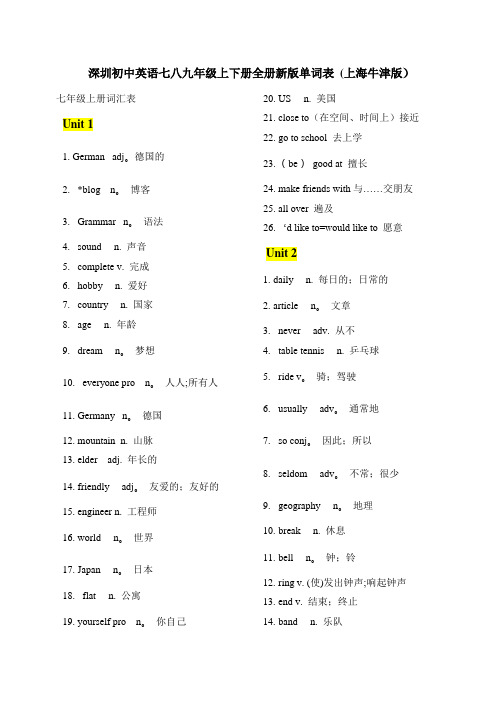
深圳初中英语七八九年级上下册全册新版单词表(上海牛津版)七年级上册词汇表Unit 11.German adj。
德国的2.*blog n。
博客3.Grammar n。
语法4.sound n. 声音plete v. 完成6.hobby n. 爱好7.country n. 国家8.age n. 年龄9.dream n。
梦想10.everyone pro n。
人人;所有人11.Germany n。
德国12.mountain n. 山脉13.elder adj. 年长的14.friendly adj。
友爱的;友好的15.engineer n. 工程师16.world n。
世界17.Japan n。
日本18.flat n. 公寓19.yourself pro n。
你自己 n. 美国21.close to(在空间、时间上)接近22.go to school 去上学23.(be)good at 擅长24.make friends with与……交朋友25.all over 遍及26.‘d like to=would like to 愿意Unit 21.daily n. 每日的;日常的2.article n。
文章3.never adv. 从不4.table tennis n. 乒乓球5.ride v。
骑;驾驶ually adv。
通常地7.so conj。
因此;所以8.seldom adv。
不常;很少9.geography n。
地理10.break n. 休息11.bell n。
钟;铃12.ring v. (使)发出钟声;响起钟声13.end v. 结束;终止14.band n. 乐队15.practice n. 练习16.together adv. 在一起17.market n。
集市;市场18.guitar n. 吉他19.grade n。
年级20.junior high school 初级中学21.on foot 步行22.take part in 参加23.have a good time 过得愉快24.go to bed 去睡觉25.get up 起床Unit 31.Earth n. 地球2.quiz n。
Unit 2 travelling around the world 词汇讲义 牛津深圳版英语七年

Unit 2 Travelling around the world1.To learn some new words and phrases in this unit.2.To know how to use these words and phrases.3.Attract students’ interest to English learning .What do you know about France ?Do you want to go travelling in Paris ?一、必记单词tick v. 标记号;打上钩France n. 法国lie v. (lay)位于;坐落在flag n. 旗帜prefer v. 更喜欢wine n. 葡萄酒ski v. 滑雪Europe n. 欧洲finish v. 完成store n.(大型)百货商店nod v. 点头vineyard n. 葡萄酒French adj. 法国的south n. 南方possible adj.可能的coast n. 海岸excellent adj. 优秀的tower n. 塔perfect adj. 完美的lift n. 电梯receiver n. 接收者step n. 台阶date n.日期stairs n. (pl)楼梯greeting n.问候address. n.地址二、常考短语1.( be) famous for 以......而闻名7. go sightseeing 去观光2.department 百货商店8.plan to do 计划做3.prefer to 更喜欢9.on the coast 在岸上4.go on holiday 去度假10.be different from 与......不同5.be know as 作为......出名11.continue to do sth 继续做某事6.take a lift 搭电梯12.at least 至少三、重点句型1. It’s a country with many beautiful places.2.You can go to the Louvre Museum if you like art.3. This is the place to go if you want to visit some shops and department stores.4. If you prefer to visit to visit France in winter, you can try skiing on the mountains in the French Alps.5. France has something for everyone, so why not visit France this year ?1.France is calling. 法国在召唤。
Unit2讲义2021-2022学年牛津深圳版七年级英语上册

深圳版牛津版七年级上Unit 2精品讲义1、掌握一般现在时的用法。
2、学会写日常活动,了解英文日记开头的写法。
3、掌握本单元出现的重点词汇和重要句型,并能灵活运用。
4、daily adj. 每日的,日常的Read a student’s article about his daily life.阅读一名学生(写)的关于他的日常生活的文章。
【拓展例句】Didn’t you read the daily news in today’s newspaper? 你没有读今天报纸上的每日新闻吗?【拓展】daily也可作副词,表示“每日,每天”,相当于every day。
The milkman es daily to our house. 送奶人每天都来我们家送奶。
5、never adv. 从不Which of these things do you never do? 这些事情中的哪些你从来不做?【单词解析】never是副词,常用于be动词、情态动词或助动词之后,实义动词之前。
I’m never late for school.我上学从不迟到。
He never goes to work so late. 他从不这么晚上班。
6、ride v. 骑,驾驶ride a bicycle 骑自行车He rides a motorbike to work. 他骑摩托车去上班。
【拓展】⑴表示出行方式的常用短语有:take a bus乘公共汽车;take a train乘火车;take the subway乘地铁;ride a bike骑自行车;ride a motorbike骑摩托车⑵ride还可以做名词,意为“(乘车或骑车的)短途旅程”,常见的搭配有:give sb. a ride“捎某人一程”;go for a ride“兜风”。
Can you give me a ride if it is convenient? 如果方便的话,你能捎我一程吗?He invited me to go for a ride in his new car. 他邀请我坐他的新车去兜风。
牛津深圳七年级上册unit2 words 课件(共21张PPT)

Seldom adv.很少 Geography n.地理 break n.休息 v.打破,
end v.结束 nether adv.在一起 market n.市场 guitar n.吉他 grade n.年级
• usually adv.通常地 He usually goes to school at 8
• So coji.因为(不能和because 连用)
• Seldom adv.很少 I seldom play computer games
• Geography n.地理 I like Geography
Unit 2.Daily life
words
• daily adj. 日常的
daily=everyday eg: daily English=everyday English daily life=everyday life My daily life is interesting
• article n.文章
end v.结束 n.末尾 v. 1.our morning class ends at 11:40 am. n. 2.at the end of 在…末尾
• band n.乐队
• practice n.练习(不可数)v.练习 n.练习 Playing the piano needs a lot of practice. v.练习 I practice my English in the morning
• break n.休息 v.打破,打碎 n. have a break=have a rest 休息一下 v.打破,打碎 Don’t break the window.
• bell n.铃 ring v.响起铃声,打电话 the bell is ringing.铃响了 please ring me (up) 请给我打电话
牛津英语深圳版七上 Unit2 词汇学习(共24张PPT)
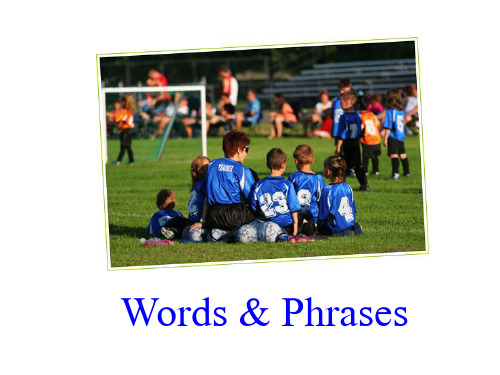
总是
I always have lunch at half past thirty.
每天 放学后
I play the piano every day after school.
几乎不 周一至周五
I seldom watch TV from Monday to Friday.
经常 在周末
I often go to bed on weekends at ten p.m.
['nevə(r)] ['seldəm] ['sʌmtaimz] ['ɔfən] ['ju:ʒuəli] ['ɔ:lweiz]
从不 很少 有时候 经常 通常 总是
sometimesusuallyalwaysoften never
Adverbs of frequency
always usually
财务部XX年度工作总结分析及述职报 告 阅读请查看本站工作总结栏目。
董事长、总经理、各位领导、各位同 仁: 新年好!借此机会给大家拜个早年!
Unit2Reading课件牛津深圳版七年级上册英语(1)

7:30–10 p.m. (6) _p_re_p_a_r_e_s_h_e_r_l_es_s_o_n_s__and helps me with my homework
11 p.m.
goes to bed
Talk time
What is your father / mother’s
schedule like?
Sam’s day at school
Activities
Sam
Me
Classes start at Morning break Lunchtime Classes end at
8 a.m 9:50 a.m. – 10:10 a.m. 11:50 a.m. – 12:30 p.m. 3:30 p.m.
8. 开始/结束 start / end v. 9. 参加 take part in … 10. 过得愉快 have a good time 11. then (1)那时;(2)然后 12. 感叹句 How + adj. + 主语 + 谓语+! 13. when conj. 引导时间状语从句,“当…时” 14. V.+doing / to do love/enjoy/like/stop/keep v. 15.人称顺序 别人在前,自己在后
=enjoy ourselves= have fun 玩得开心
take part in … 参与、参加某活动
• take part in a meeting • take part in a game • take part in after-school activities
Revision
1. 由某人所写/创作 by sb. 2. 初中 junior high school 3. 高中 senior high school 4. 因为/所以 because/so 5. 早上/下午 a.m. / p.m. 6. 了解、学习有关…的内容 learn about … 7. 休息 break n. / break v.
Unit2+词汇+课件2023-2024学年牛津深圳版英语七年级上册
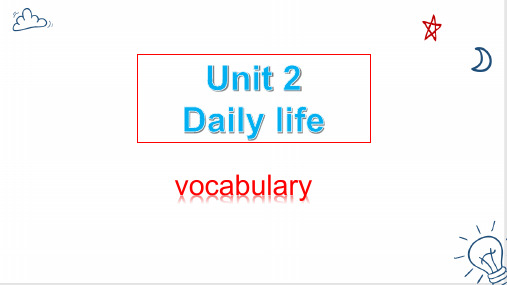
Sam goes back home. Sam goes to bed very early. Sam has a good time at school.
go to bed have a good time
Sam’s daily Life
The children play games together during the m__o_rn_i_n_g b_r_e_ak__ . 4. 他在课后参加各种各样的活动。
He __ta_k_es__p_ar_t _in___ all kinds of activities after school.
1. 昨天我过得很开心,因为我见到了很多老朋友。 I __h_a_d _a___g_o_o_d_ t_im__e_ yesterday because I met a lot of old friends. 2. 我妈妈从早到晚都在做家务。
My mother does the housework __fr_o_m morningto____ night. 3. 在早上休息期间,小朋友们一起玩游戏。
2. When I was doing my homework at home yesterday afternoon,
suddenly the door b_e_ll___ rang.
3. Starting to speak a foreign language takes lots of p_ra_c_t_ic_e__. 4. It u_su_a_l_l_y_____ snows hard in winter in Harbin because its
- 1、下载文档前请自行甄别文档内容的完整性,平台不提供额外的编辑、内容补充、找答案等附加服务。
- 2、"仅部分预览"的文档,不可在线预览部分如存在完整性等问题,可反馈申请退款(可完整预览的文档不适用该条件!)。
- 3、如文档侵犯您的权益,请联系客服反馈,我们会尽快为您处理(人工客服工作时间:9:00-18:30)。
词汇语言点world’s language points
1.与国家,国籍,语言有关的名词或者形容词要大写。
例如:beautiful France美丽的法国;
French fries(法国的)炸薯条;复习:I want to learn German(德语)in Germany.(德国);
I am going to buy a German VW/Mercedes/Audi in no more than15 years. 我打算未来不超
过15年买一辆德国大众汽车/奔驰汽车/奥迪汽车。
2.There are three colors in French flag such as white, blue and red.法国国旗有三种颜色:白,
蓝,红。
3.—Do you like drinking French wine or red wine? 你爱喝法国葡萄酒还是红酒?
—I like both of them. 这两者我都爱。
4.tick=get 打上钩;mark做标记,标志如mark pen 马克笔;
sign 路面标识如traffic signs路标
5.形容词与副词的转换(的与地转换)
possible adj. 可能的反义词impossible 不可能的副词possibly 可能地
如Nothing is Impossible(李宁运动广告语)一切皆有可能;
现如今的广告语为Make the Change 做出改变
probable adj. 很可能的副词probably 很可能地
描述可能还有一个情态动词may 如may do sth.可能做某事;maybe 可能是,有可能。
6.专有名词Europe 欧洲,首字母大写。
如France is in Western Europe. 法国在西欧位置。
描述方向的名词为北N(north), 南S (south),西W(west),东E(east);四个方向的形容词分别为:northern, southern, western, eastern. 注意south 和southern, 同时ou字母组合,发音却不同。
7.store n. 大型,小型百货商店都可以使用,还有仓库的意思。
而阁楼是attic
8.department store 短语百货商店。
department 在大学根据专业类别不同也有学院的意思。
9.如外国语学院,生命科学学院,法学院,经济学院等等。
10.An excellent student 一名优秀的学生;Alice not only gets goods grades in every exam, but
also helps others’ studies. So she is very excellent. 同时excellent 在口语中有做的非常好的意思。
等同于一下单词和短语:well done! good job! perfect! amazing! wonderful!
fantastic!
11.。
